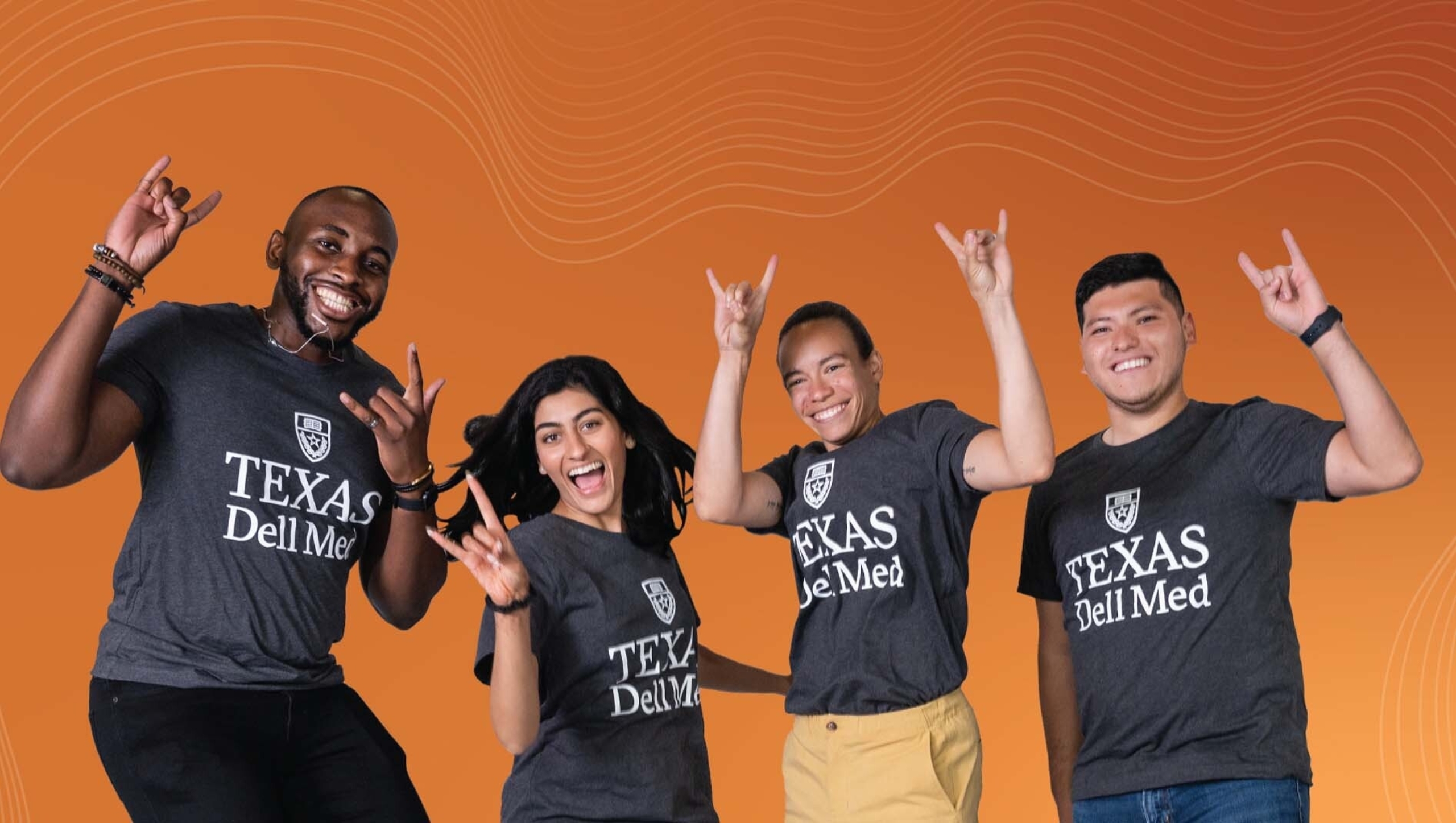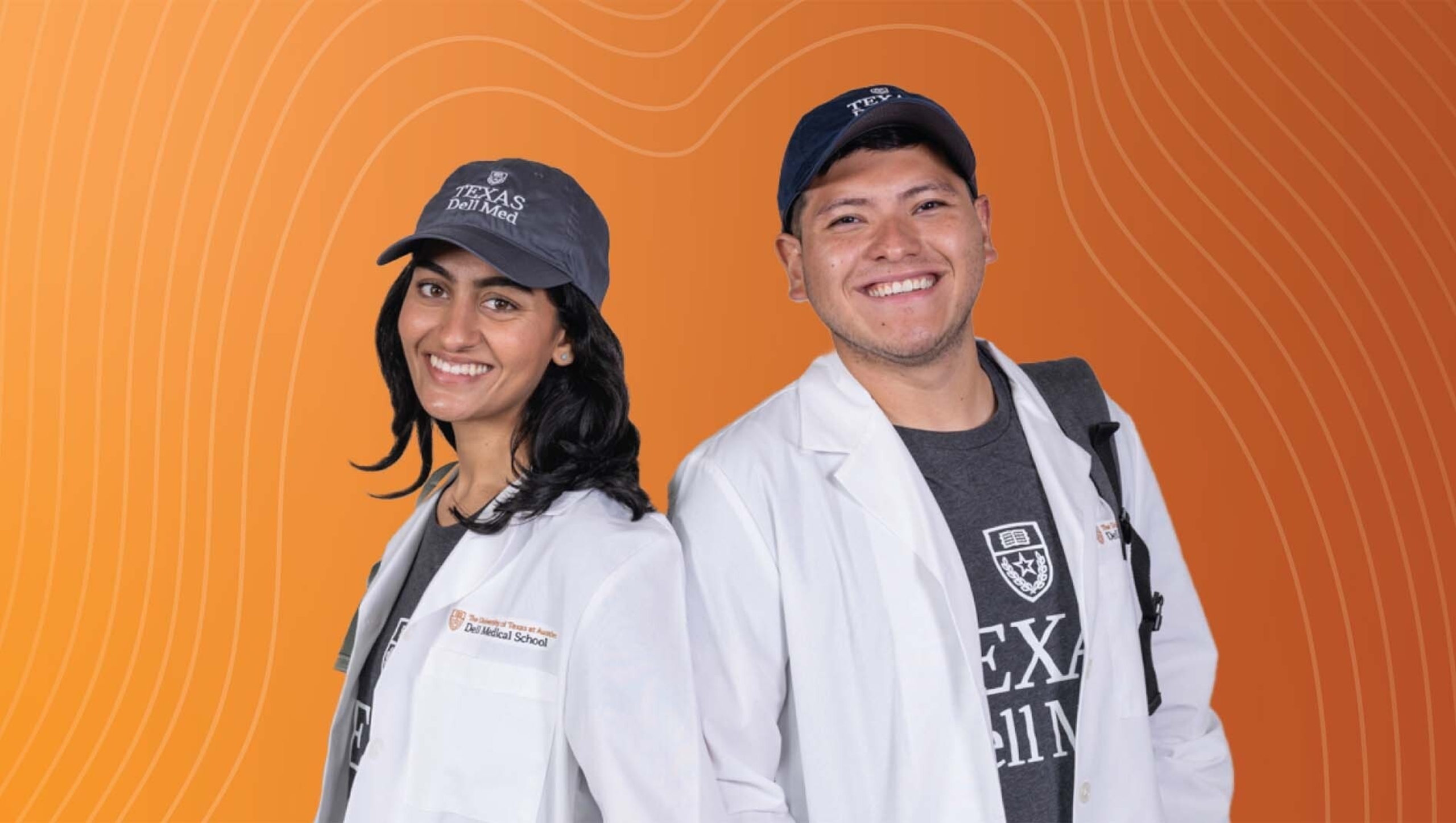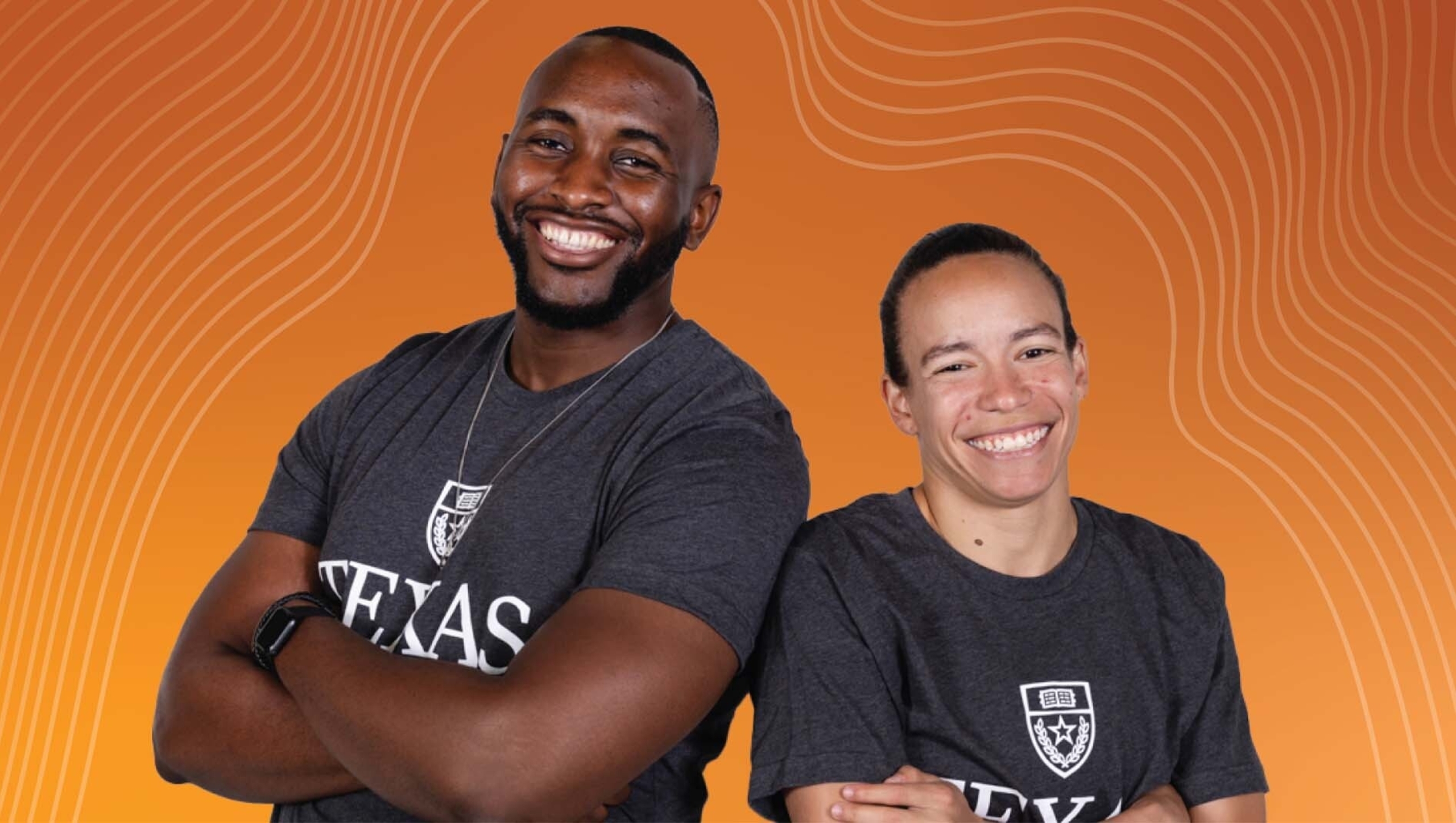This summer, the 51 students in Dell Med’s newest class of future physician leaders are joining their peers in learning how to transform health at every level, from patients to populations.

Jordan Tanyi, Zahra Ansari, Sam Little and Giezi Contreras, Dell Med Class of 2027.
They’ll learn the building blocks of medicine, from biology to clinical care delivery. But as these future leaders know, they’ll also learn much more through Dell Med’s Leading EDGE curriculum: How to effect change to solve health care’s most pressing systemic issues while also offering empathetic, person-centered care to each patient they work with.
Meet four of them now.

Zahra Ansari and Giezi Contreras, Dell Med Class of 2027.
Zahra Ansari
Hometown: San Diego, California
Alma Mater: University of California, Berkeley — B.A., Public Health
What makes Dell Med the best fit for you?
I first worked in public health as a case manager, seeing 40-50 patients daily who were either transgender, experiencing homelessness or previously incarcerated. Their difficulties navigating care showed me that our health system is not built for everyone. However, I saw up close how patients benefited from digital tools: For example, one patient was an immigrant from Iraq and relied on a digital translator to speak to me and her physicians. Her phone acted as a literal lifeline.
All of this and more, like my experiences researching digital health and health disparities at the National Institutes of Health, has shown me that there is enormous potential to reframe our health care system to accommodate America’s most vulnerable. When I decided to apply to medical school, Dell Med’s mission was the most aligned with my goal of redesigning the health landscape where all communities could thrive. Through the innovative curriculum here, I hope to bridge my interests in medicine and technology to cultivate an inclusive health care infrastructure that makes it easy for all groups to be healthy.
What’s your motto?
“Opportunity comes disguised as hard work.”
This quote was plastered on my dad’s bedroom door in Lahore, Pakistan, while he studied for his own medical school exams almost 40 years ago. He frequently reminds me of this message when I feel overwhelmed by my medical school journey. While I know the path ahead will be difficult, the hard work is just a steppingstone to greater fulfillment later.
There is enormous potential to reframe our health care system to accommodate America’s most vulnerable.
Zahra Ansari, Dell Med Class of 2027
Giezi Contreras
Hometown: Arlington, Texas
Alma Mater: The University of Chicago — B.A., Biological Sciences (Specialization in Endocrinology) & Neuroscience
You’re admitted to medical school. Tell us how you got here.
My journey toward medical school began with a diagnosis: At nine years old, I was diagnosed with rare recurrent larynx tumors, a condition that would require regular surgical intervention. Thankfully, I went into remission after several surgeries. This experience was frightening, but it also sparked an interest in medicine that never faded, as it showed me how medicine can very tangibly change a life. The fear and anxiety that I felt were converted into an ardent desire to give others hope, encouragement and a voice of their own, despite nearly losing mine.
Later, reflecting on my experiences brought my attention to the health disparities that exist within immigrant and socioeconomically disadvantaged communities. Having two younger brothers with disabilities likewise gave me insight into the systemic biases against disabilities that are built into the health care system. I hope to become a physician that advocates for patients like myself, my brothers and those from disadvantaged communities — ultimately fostering a more inclusive, empathetic and patient-centric health care environment.
Choose up to three dream dinner party guests — real or fictional, famous or personal, alive or not. Who are they, and why?
I would extend an invitation to Nayib Bukele, the president of El Salvador, the country of my heritage. His unique strategies in addressing the nation’s issues are intriguing, and I’d be interested to hear his thoughts on multifaceted challenges the U.S. faces, particularly in health care.
Joining us would be my cherished grandmother, an unwavering pillar of strength and wisdom, who has provided me an invaluable model of resilience. To round off the guest list, I’d invite Paul Farmer, co-founder of Partners in Health. His relentless commitment to advocating for health equity echoes my own aspirations in medicine.

Jordan Tanyi and Sam Little, Dell Med Class of 2027.
Jordan Tanyi
Hometown: Douala, Cameroon & Sugar Land, Texas
Alma Mater: The University of Houston — B.S., Biotechnology
What made you into the future doctor you are today?
I didn’t decide I wanted to be a doctor until I was halfway through college. Through my work as a caregiver at a group home for adults with mental health disorders, I discovered that studying medicine and becoming a doctor was where I really wanted to be. I got the opportunity to confirm that through shadowing and clinical experience as a pharmacy technician immunizer and when I earned a post-baccalaureate certificate in biomedical sciences and health equity at Baylor College of Medicine.
Physicians play a leading role in the delivery of health care across the globe. I believe that being a leader in health care entails a lot more than treating just the patients in front of you; it requires bringing together whole communities and determining the root causes of health inequities so we can better build a system that serves those who needed it most. I consider becoming a physician an extension of the greater impact I want to have on my community.
What’s one thing that you think needs to be tackled to improve health, locally or globally (or both)?
Misinformation: General misinformation and ignorance are associated with health disparities. Often, people are unknowingly exposed to health hazards and experience subsequent health problems. And in some cases, little is known about how to seek help and available public resources to alleviate some of these issues.
Sam Little
Hometown: Yokota Air Force Base, Japan
Alma Mater: United States Coast Guard Academy — B.S., Marine & Environmental Sciences; National University — Master of Public Health; A.T. Still University — M.S., Physician Assistant Studies
What did your path to medical school look like?
My path to Dell Medical School was anything but direct. As a child, I idolized my father, a career military officer, and knew I wanted to follow in his footsteps. I was commissioned as a U.S. Coast Guard officer and appreciated the immense amount of responsibility and opportunities to lead law enforcement and marine safety missions. Most of all, I enjoyed using my position to help others; I saw firsthand how excellent leaders could create an inclusive culture where people thrive, and how the opposite can be truly devastating.
I discovered my passion for medicine through exposures to both global and domestic health inequities — too many populations, often historically marginalized communities, don’t have access to essential health care due to ingrained barriers and generations of ineffective policy. After I completed active duty, I became a physician assistant and was fortunate to have physician mentors who inspired me to pursue medical school. These leaders were experts in their field who also implemented system-wide changes to better the lives of their employees and patients. I hope to have a similar impact on my patients, combining my love for leadership, medicine and service to others as a future physician.
What’s the most important thing for people to know about you?
I love meeting new people from various backgrounds and cultures. Growth happens when we are challenged and introduced to new perspectives. I’ve lived all throughout the United States, traveled to 34 countries and had the opportunity to attend high school outside Tokyo, Japan.
Learning to lean on the kindness of others while traveling has shaped how I try to approach my own life, too. For example, during a weeklong trek through the Andes Mountains, I suffered severe altitude sickness. Many generous Peruvians helped me along the way, offering horse rides and water, never minding my broken Spanish or foreign appearance. I hope to convey the same generosity to others, especially when they are in need or feel out of place.